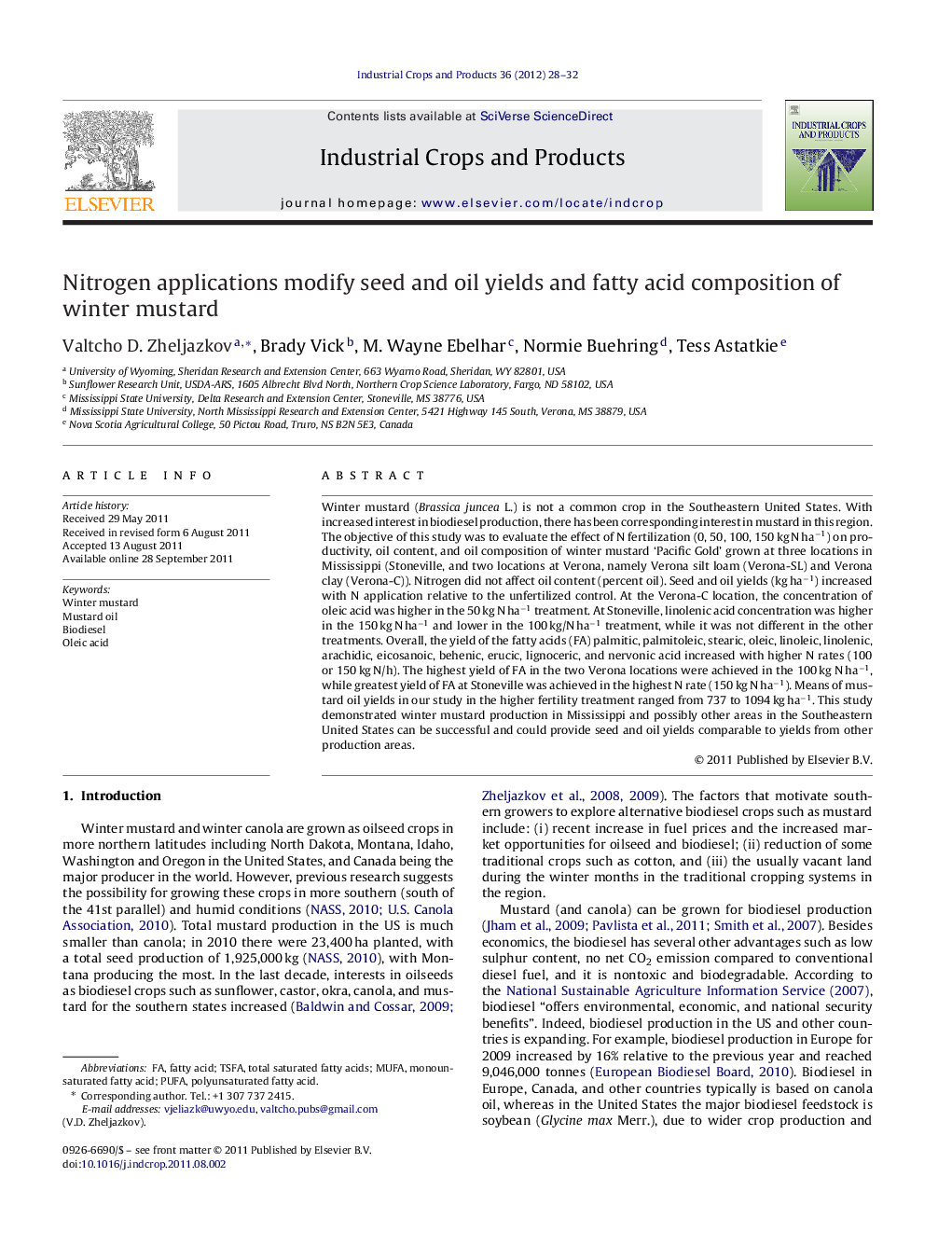| کد مقاله | کد نشریه | سال انتشار | مقاله انگلیسی | نسخه تمام متن |
|---|---|---|---|---|
| 4514348 | 1322209 | 2012 | 5 صفحه PDF | دانلود رایگان |

Winter mustard (Brassica juncea L.) is not a common crop in the Southeastern United States. With increased interest in biodiesel production, there has been corresponding interest in mustard in this region. The objective of this study was to evaluate the effect of N fertilization (0, 50, 100, 150 kg N ha−1) on productivity, oil content, and oil composition of winter mustard ‘Pacific Gold’ grown at three locations in Mississippi (Stoneville, and two locations at Verona, namely Verona silt loam (Verona-SL) and Verona clay (Verona-C)). Nitrogen did not affect oil content (percent oil). Seed and oil yields (kg ha−1) increased with N application relative to the unfertilized control. At the Verona-C location, the concentration of oleic acid was higher in the 50 kg N ha−1 treatment. At Stoneville, linolenic acid concentration was higher in the 150 kg N ha−1 and lower in the 100 kg/N ha−1 treatment, while it was not different in the other treatments. Overall, the yield of the fatty acids (FA) palmitic, palmitoleic, stearic, oleic, linoleic, linolenic, arachidic, eicosanoic, behenic, erucic, lignoceric, and nervonic acid increased with higher N rates (100 or 150 kg N/h). The highest yield of FA in the two Verona locations were achieved in the 100 kg N ha−1, while greatest yield of FA at Stoneville was achieved in the highest N rate (150 kg N ha−1). Means of mustard oil yields in our study in the higher fertility treatment ranged from 737 to 1094 kg ha−1. This study demonstrated winter mustard production in Mississippi and possibly other areas in the Southeastern United States can be successful and could provide seed and oil yields comparable to yields from other production areas.
► Recent interests in biodiesel production rationalized the evaluation of winter mustard (Brassica juncea L.) for the hot humid conditions of Southeastern United States. We evaluated the effect of N (0, 50, 100, 150 kg N ha−1) on productivity, oil content and oil composition of winter mustard ‘Pacific Gold’ grown for two cropping seasons at three locations in Mississippi.
► Means of mustard oil yields in our study in the higher fertility treatment ranged from 737 to 1094 kg ha−1. These oil yields would provide 685–1017 kg biodiesel per ha. Overall, the yield of FA palmitic, palmitoleic, stearic, oleic, linoleic, linolenic, arachidic, eicosanoic, behenic, erucic, lignoceric, and nervonic acid increased with higher N rates (100 or 150 kg N ha−1).
► This study demonstrated winter mustard production in Mississippi and possibly other areas in the southeastern United States can be successful and could provide seed and oil yields comparable to yields from other production areas in this country or elsewhere.
Journal: Industrial Crops and Products - Volume 36, Issue 1, March 2012, Pages 28–32